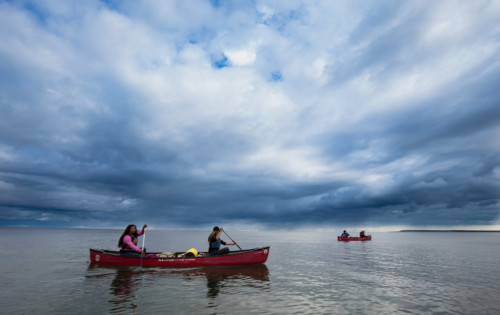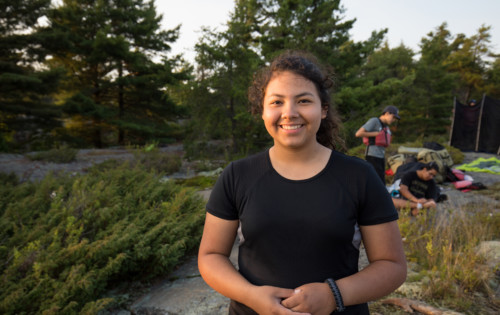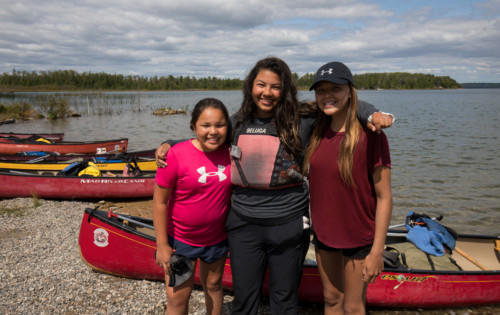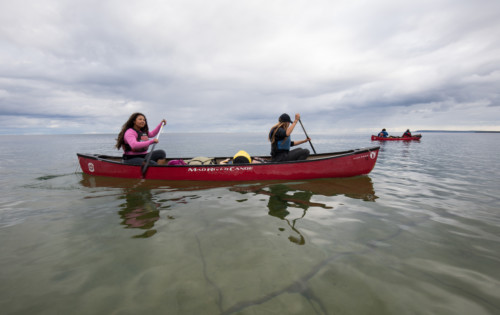Our world seems broken beyond repair. Corruption. Grinding poverty. Endless conflicts. Starvation. Who can fix these problems? Where do you even start?
Even in our own country we can spot these seemingly intractable issues. We are aware of a long history of injustice, discrimination, and even hatred towards the First Nations of Canada. If we are honest, some of us are tired of hearing about their struggles. We would rather focus on other things. It is simply too disheartening to dwell on something that we can’t change.
Or can we?
Wikwemikong is a First Nations community located on Manitoulin Island in Northern Ontario. Their community slogan is ‘Proud and Progressive’. Everything they do is guided by this mantra. They work hard to bring positive changes to their community, from the young to the elderly. They work equally hard to preserve their cultural identity as Anishnaabe people through cultural events, teaching their young people their traditions and Grandfather Truths, and Ojibwe language lessons. They believe in investing in their youth.


Something wonderful happens when the right people gather around the right table at the right time, in the right place, and with the right ideas. ADRA Canada was invited to the table with IGNITE Infrastructure Association and the Wikwemikong community to discover ways to help the young people of Wikwemikong realize their full potential.
According to a study released by the Canadian Centre for Policy Alternatives (CCPA) in June 2013, the sad truth is that First Nations youth “trail behind the rest of Canada’s children on practically every measure of well-being: family income, education, crowding and homelessness, poor water quality, infant mortality, health, and suicide.”
Project MAPLE is a partnership between the Wikwemikong community, IGNITE, and ADRA Canada. The project aims to make a sustainable difference in the lives of the 880 indigenous youth in Wikwemikong. Activities include supporting and augmenting the nutrition programs at the elementary, middle, and high schools; supporting the local youth centre which runs a number of programs geared towards building the confidence, character, and leadership skills of the young people; furnishing a resource room for children with special needs; and 21st-century learning labs in classrooms that inspire, build skills, and prepare minds for 21st-century employment.
MAPLE’s most recent activity was helping to sponsor the Outdoor Adventure Leadership Experience (OALE). Each year, the youth centre takes groups of young people on a 10-day canoe trip through the wilderness. During the trip, the youth learn about their history, culture, and identity. Through the guidance of well-trained leaders, they explore their own strengths and weaknesses, develop their character, set life goals and discover practical steps they can take to achieve them. With each passing day, their confidence grows and they begin to see their own boundless potential.


This summer was 15-year old Mary’s second trip with the OALE program. She had participated several years ago but wanted to challenge herself again.
This year’s trip proved to be much more difficult than her first. “This ten-day trip, so far, has been very emotional. It’s physically taxing because I’m not a very active person. But I was willing to push myself to do it again. Even though I cried a couple of times and it’s been hard, I was willing to push through it to get home again, to experience the whole thing, and to learn more about where we are, what we’re doing, who we are as Anishnaabe people.”
At the end of every day, the group gathers around a fire to talk about their Grandfather Truths, their dreams, their challenges, and what they can do to achieve their goals. Mary’s long-term dream is to become a medical officer in the Canadian military. “I always liked helping people whenever I got the opportunity,” she shares. “I think that if I can be here on the canoe trip and persevere, then I can probably push myself through to be in the military.”
When asked how she thinks the OALE trip empowers young people to pursue their goals, her answer was telling. “The OALE program is a big help to young Anishnaabe people. I found most of them have low self-esteem. They believe they don’t have the right answers, that they can’t do it. The leaders have really good positive attitudes. They tell you to keep going, to persevere. They really want you to finish. I think that gives the youth a lot of confidence to keep going, that they should continue to pursue their dreams.”
As she reflected on other participants she knows that have been on the trip, Mary had a compelling observation. “They end up more like leaders. They take charge. They help others to reach what they’re trying to do. They tend to be more resilient in hard times and they push through a lot more than they did before.”
While indigenous youth across the country drop out of school at alarming rates, 100% of all youth who participated in the OALE trips in 2013, 2014, and 2015 have graduated from high school.
Can a difference be made? We believe that yes, it can! This is the beginning of MAPLE’s activities. There are more to come. And hopefully, MAPLE is but the beginning of more projects like it across Canada. Partner with Wikwemikong, ADRA, and IGNITE and together let’s turn the tide for indigenous youth!
